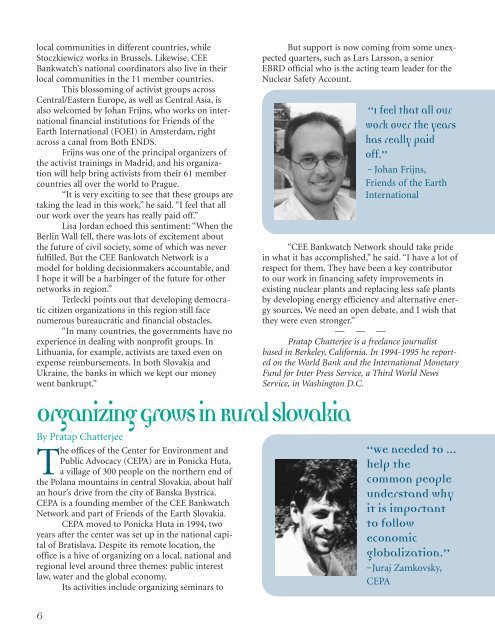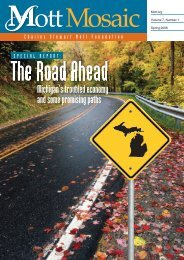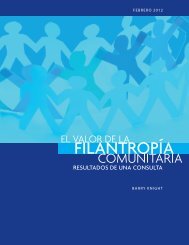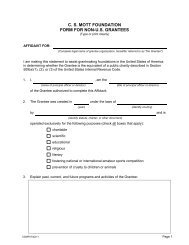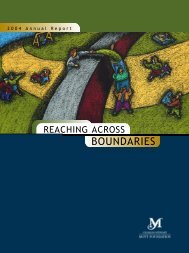mottnow August 2000 - Charles Stewart Mott Foundation
mottnow August 2000 - Charles Stewart Mott Foundation
mottnow August 2000 - Charles Stewart Mott Foundation
- No tags were found...
Create successful ePaper yourself
Turn your PDF publications into a flip-book with our unique Google optimized e-Paper software.
local communities in different countries, whileStoczkiewicz works in Brussels. Likewise, CEEBankwatch’s national coordinators also live in theirlocal communities in the 11 member countries.This blossoming of activist groups acrossCentral/Eastern Europe, as well as Central Asia, isalso welcomed by Johan Frijns, who works on internationalfinancial institutions for Friends of theEarth International (FOEI) in Amsterdam, rightacross a canal from Both ENDS.Frijns was one of the principal organizers ofthe activist trainings in Madrid, and his organizationwill help bring activists from their 61 membercountries all over the world to Prague.“It is very exciting to see that these groups aretaking the lead in this work,” he said. “I feel that allour work over the years has really paid off.”Lisa Jordan echoed this sentiment: “When theBerlin Wall fell, there was lots of excitement aboutthe future of civil society, some of which was neverfulfilled. But the CEE Bankwatch Network is amodel for holding decisionmakers accountable, andI hope it will be a harbinger of the future for othernetworks in region.”Terlecki points out that developing democraticcitizen organizations in this region still facenumerous bureaucratic and financial obstacles.“In many countries, the governments have noexperience in dealing with nonprofit groups. InLithuania, for example, activists are taxed even onexpense reimbursements. In both Slovakia andUkraine, the banks in which we kept our moneywent bankrupt.”But support is now coming from some unexpectedquarters, such as Lars Larsson, a seniorEBRD official who is the acting team leader for theNuclear Safety Account.“I feel that all ourwork over the yearshas really paidoff.”- Johan Frijns,Friends of the EarthInternational“CEE Bankwatch Network should take pridein what it has accomplished,” he said. “I have a lot ofrespect for them. They have been a key contributorto our work in financing safety improvements inexisting nuclear plants and replacing less safe plantsby developing energy efficiency and alternative energysources. We need an open debate, and I wish thatthey were even stronger.”— — —Pratap Chatterjee is a freelance journalistbased in Berkeley, California. In 1994-1995 he reportedon the World Bank and the International MonetaryFund for Inter Press Service, a Third World NewsService, in Washington D.C.Organizing Grows in Rural SlovakiaBy Pratap ChatterjeeThe offices of the Center for Environment andPublic Advocacy (CEPA) are in Ponicka Huta,a village of 300 people on the northern end ofthe Polana mountains in central Slovakia, about halfan hour’s drive from the city of Banska Bystrica.CEPA is a founding member of the CEE BankwatchNetwork and part of Friends of the Earth Slovakia.CEPA moved to Ponicka Huta in 1994, twoyears after the center was set up in the national capitalof Bratislava. Despite its remote location, theoffice is a hive of organizing on a local, national andregional level around three themes: public interestlaw, water and the global economy.Its activities include organizing seminars to“We needed to …help thecommon peopleunderstand whyit is importantto followeconomicglobalization.”- Juraj Zamkovsky,CEPA6


